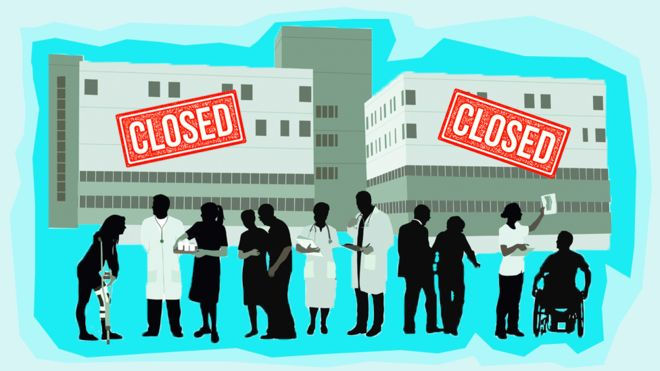Hospital cuts planned in most of England
- Feb 22, 2017
- 4 min read

Hospital services in nearly two-thirds of England could be cut or scaled back, BBC analysis of local plans shows.
The proposals are part of a programme to transform the health service and save money across 44 different areas.
The BBC found 28 proposals affect hospital care, from full closures to centralising services, such as A&E and stroke care, on fewer sites.
NHS England argue patients will receive better care in the community to compensate for the hospital cuts.
The proposals also include the creation of "super" community hubs of GPs, care workers and district nurses, seven-day access to GPs and getting hospital specialists to run clinics in the community.
The BBC analysis found:
Plans to reduce the number of major hospital sites in Leicester, Leicestershire and Rutland from three to two
In the Black Country they are planning to reduce the overall number of major hospitals by one, although a new hospital is being built
Maternity and children's services being "centralised" on to one site in Lincolnshire
A warning in West Yorkshire and Harrogate that having five hyper-acute stroke services may "no longer be viable"
The downgrading of two out of three A&Es in Mid and South Essex, with only one retaining specialist emergency care
In South West London, proposals to reduce the number of major hospitals from five to four
Plans in Nottinghamshire to significantly downsize City Hospital and reduce the number of beds across Nottingham by 200
In Cambridgeshire and Peterborough, consideration being given to centralising specialised orthopaedic trauma services at two local hospitals
Overall, a third of the 44 plans look to reduce the number of hospitals providing emergency care, while in another third of areas they have said they will consider moving non-emergency care to fewer sites.
Will the plans work?
The King's Fund think tank, which has also carried out a review of the plans, warned that a lack of investment meant the ideas being put forward were not always credible.
The government is investing more money in the health service, but a fund set up to pay for changing services has been used to tackle NHS deficits, figures released on Monday showed.
The King's Fund warned that community services in many areas were already "feeling the strain" and could not cope with an increase in workload.
And the think tank said further reductions in the number of hospital beds could destabilise services that were already "stretched to their limits" following the difficult winter.
Prof Chris Ham, the think tank's chief executive, said they were still the "best hope of delivering essential reforms" in the NHS, as care needed to be moved out of hospital.
This is seen as vital because the ageing population and growth in long-term conditions, such as dementia and heart disease, mean people are more likely to benefit from support in the community to stay well rather than inpatient hospital care when their health deteriorates.
How the transformation programme works
The proposals - known as sustainability and transformation plans - have been drawn up as part of NHS England's five-year strategy to release £22bn of efficiency savings by 2020.
Reviews were set up in early 2016 and consultations on major changes will take place later this year with the hope that implementation will follow soon after.
But the King's Fund warned that the changes could be subject to legal challenges.
Is extra money needed?
A £1.8bn pot set aside this year for funding transformation has been used to shore up NHS trust finances as they struggle to balance their books.
A Department of Health spokesman maintained that the extra money being invested in the NHS this Parliament still gave the health service enough funds to change the way it worked.
"These NHS plans - developed by local doctors, hospitals and councils working together with the communities they serve - will help patients get better care," he added.
But others have questioned whether this will be enough. The NHS budget is forecast to rise by about 1% a year above inflation on average during this Parliament - much less than the 4% average the NHS has enjoyed throughout the rest of its history.
New technologies
There is a lot of support for the concept of moving care out of hospitals. It is hoped it will help keep people well and living independently in the community.
NHS England, which is overseeing the plans, said they offer the best hope of improving patient care in a sustainable way.
"They will allow the NHS to take advantage of new technologies, adopt successful practice more widely, and make practical improvements in areas that we know matter most to patients," a spokeswoman added.
Jeremy Taylor, chief executive of patient group National Voices, said while the process was "not without flaws", the overall vision had the potential to meet 21st Century needs.
"More than 70% of the NHS budget is spent on people with at least one long-term condition. This is a severe challenge to a system originally set up to provide reactive care for spells of illness."
The benefits of scaling back hospital services
Stroke care in London is now world class - and it is all because some services were shut down.
The capital's stroke care was overhauled in early 2010. Instead of being spread across 30 hospitals as they used to be, services are now centralised on eight "super sites".
It has meant patients get fast, 24-hour access to the best care, saving hundreds of lives a year.
If a stroke is suspected, a patient is immediately taken to one of the eight centres. There they are assessed by a stroke specialist and given a brain scan within 30 minutes of arrival.









































Comments